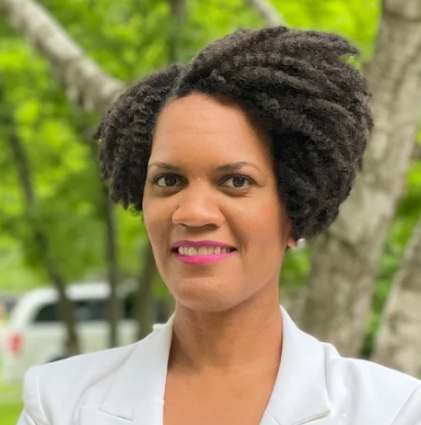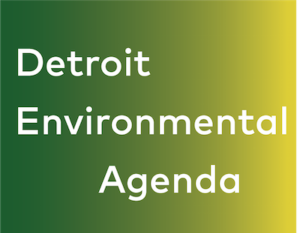Latisha Johnson

Q: Where can people go to learn more about your biography? If not readily available online, please describe in 150 words or less, your relevant experience, public offices held (if any), involvement in environmental causes, and membership in any environmental organizations. If you currently hold office, describe any votes or actions demonstrating concern for the environment.
A: Latisha is a member of Third New Hope Church, wife and mother of an 18-year old son. Latisha is a graduate of University of Michigan- Dearborn with a degree in finance. She began her career in Detroit’s tourism industry, marketing the city for visitors and attracting millions of dollars in spending to the local economy.
In 2007 Latisha began serving the community. She was inspired to work together with neighbors to promote and strengthen the community during one of the most distressed times in Detroit’s history. She served tirelessly as a Vice President of the East English Village Neighborhood Association by overcoming blight, holding financial institutions accountable and preventing resident foreclosures.
In 2014, she responded to her community’s need for a strategic vision by founding MECCA Development Corporation. For the past seven years, she has partnered with residents to address concerns of well-being, workforce development, youth engagement, and neighborhood revitalization. Latisha’s leadership has led to the implementation of the Community Closet free store, skill building programs, rehab of affordable houses and development of a small nonprofit center.
Latisha has also served as the Treasurer for the 5th Precinct Police/Community Relations Council, Vice Chair for the City of Detroit’s Board of Zoning Appeals, Wayne Metro Community Action Agency Regional Advisory Council member and Wayne State University’s AmeriCorps Urban Safety Program.
Community
Q: If elected, how will you work with Detroit residents to ensure that they benefit from and partake in the decision-making surrounding local development projects and that potential adverse impacts of those projects are identified, measured, monitored and mitigated? Moreover, how would you work to put more power into the hands of residents to maintain and revitalize their own communities and to access vacant land through the DLBA?
A: When elected I will ensure that citizens are engaged through a community advisory group. Myself and others have taken initiative within our community to repurpose both housing and vacant lots, so I plan to leverage those relationships that I have built within the community to expand resources and ease of access of acquiring land through the DBLA.
Q: If elected, what budget appropriations would you propose to increase investment in needed social and environmental services to help improve the quality of life and health of Detroit residents?
A: When elected I will begin focusing on affordable housing, recreation centers, and public health.
Public Health
Q: What long term solutions do you see for addressing vehicle speeds and making our streets safer?
A: One known issue in the city of Detroit is drag racing. We saw a major decline in incidents when those drivers were given designated space for their recreation. We as a city could find a way not only to invest in new recreational spaces for these drivers, but to also create community amongst this increasingly popular hobby. Furthermore, this effort could drastically increase public safety by limiting the sport to a closed and restricted area.
In residential areas, I would continue to advocate for the investment in speed bumps.
Q: How will you work to reduce the negative health impacts of air quality on the residents of Detroit?
A: Simply offering tax incentives is not enough to keep air quality controlled, I would also work on regulation that would assess penalties to those plants and factories that are excessively contributing.
On a micro-level, I believe that there are things that we as individuals can do simply by recycling to curve that effects on the air quality. I would push for more incentives for small/medium businesses to recycle, understanding how sometimes the strain on cost could dissuade those businesses from recycling.
Q: If elected, what actions will you take to work toward safer, healthier, and more affordable housing for all Detroiters?
A: When elected I will work on programs to help Detroiters stay in their homes, as well as secure investment so that Detroiters also have help maintaining their homes.
Energy
Q: What are your priorities to reduce emissions and lessen the impacts of climate change in Detroit during your term in office?
A: My priorities in lessening the impacts of climate change is to explore options of renewable energy, specifically hydroelectricity. I would also explore investments into electric transportation.
Q: What are your plans for helping the city transition to renewable energy and how will you ensure that the cost benefits and increased resilience that come from the use of renewables is made accessible to low-income and vulnerable communities across Detroit?
A: As previously stated, renewable energy is at the top of my priorities. My goal is to lessen the cost for all residents, but especially those that are most vulnerable, as energy costs have steadily increased.
Recycling
Q: How can the city increase recycling, composting, and the use of post-consumer recycled materials, while addressing the city’s litter and illegal dumping problem?
A: The city can invest in more trash and recycling bins through the city to lessen the amount of litter as well as pollution. Illegal dumping has to be taken more seriously than in the past, it has made conditions in the neighborhood undesirable for residents. I believe investing in housing, which would give people a sense of ownership and communal pride, could cause a huge decline in unreported and unwanted dumping.
Jobs
Q: What steps would you take to prepare the local workforce to take advantage of and be part of the movement toward a green economy, through qualifying for good paying infrastructure and clean energy jobs, amongst others?
A: I would work to partner with “green” organizations as well as our local colleges and trade schools to provide training for these “green” jobs, and ensure that Detroiters are majority recruited and hired.
Water
Q: How will you ensure that clean water is accessible and affordable to all Detroiters?
A: Much of the issue to access clean water is the need for expensive repairs for pipes, ensuring that residents have access to resources to get these costly repairs would keep water, pollutant free and cost down.
Q: How will you help municipal agencies and property owners integrate Green Stormwater Infrastructure (GSI) across the city to manage stormwater and reduce drainage charge fees for property owners?
A: I believe that first reaching out to business owners and giving them information on the GSI program would bring awareness that many times small business owners especially are not aware of.
Optional
Q: Please identify the top environmental concerns to you personally, identify the environmental issue in your community that is the most pressing, and what you would like to do as an elected official to address this most pressing concern.
A: Being a resident of East English Village, and serving within D4 over the last 14 years, I am constantly being made aware of the constant issue with flooding and how it especially has affected the foundation of homes. Addressing this is at the top of my priorities

